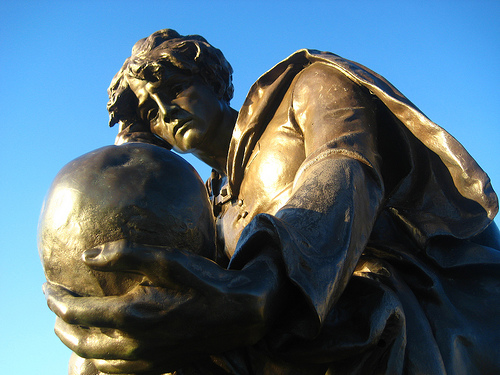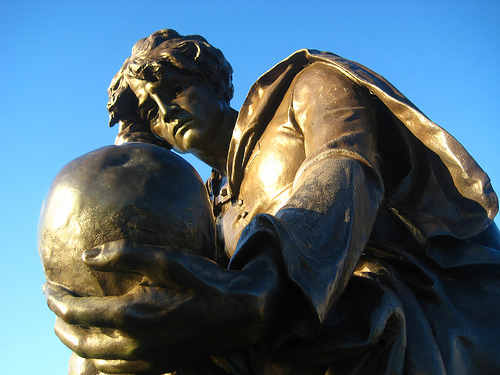I’ve been threatening my editors with a post on what Shakespeare’s Hamlet can teach the diplomats gathering next week to draft a new international climate treaty. Hamlet being a fictional Danish prince, and Copenhagen being in Denmark and … OK, it’s a flimsy hook. Don’t care. As I write this, I’ve got 12 hours of flying to fill. Here goes.
 Hamlet ponders the fate of … the planet. Sheep Purple via Flickr.comThe tragic-flaw reading of the play holds that Hamlet fails in his task of avenging his father’s murder because he is too indecisive. When he has the opportunity to stab his uncle, the murderer (who seems to be distracted in prayer), Hamlet instead waits in the shadows and ponders the meaning of it all.
Hamlet ponders the fate of … the planet. Sheep Purple via Flickr.comThe tragic-flaw reading of the play holds that Hamlet fails in his task of avenging his father’s murder because he is too indecisive. When he has the opportunity to stab his uncle, the murderer (who seems to be distracted in prayer), Hamlet instead waits in the shadows and ponders the meaning of it all.
Is indecisiveness the tragic flaw of our world leaders? Fiddling while Rome burns and all that? Shakespeare’s too rich for such a simplistic reading. It was a ghost who told Hamlet his uncle was a murderer, after all. Not the most reliable source. A single flaw doesn’t explain Hamlet, and I’m not sure it explains our climate predicament.
Another venture: Hamlet works within the revenge-story genre — the hero suffers a grievance, pursues justice, and, if successful, restores the natural order of things. Uncle Claudius poisoned his brother, seduced his brother’s wife, and stole his brother’s kingship. Hamlet sets out to avenge his father.
 But this was the revenge story after which no revenge story would ever be the same. For the brooding, ponderous Hamlet, vengeance becomes not just a logistical challenge—how to catch his uncle off guard—but a moral dilemma. Shakespeare doesn’t offer answers to the problem—this is serious tragedy—but he calls into question whether it’s even possible to restore some prior “order,” through violence or any other means. It’s not clear that it was ever possible to go back to the way it was. And it’s not clear how the blood-bath closing scene could have been avoided, but the fixation on revenge (by Hamlet, by the young dude Laertes, by Fortinbras, prince of Norway) has something to do with it.
But this was the revenge story after which no revenge story would ever be the same. For the brooding, ponderous Hamlet, vengeance becomes not just a logistical challenge—how to catch his uncle off guard—but a moral dilemma. Shakespeare doesn’t offer answers to the problem—this is serious tragedy—but he calls into question whether it’s even possible to restore some prior “order,” through violence or any other means. It’s not clear that it was ever possible to go back to the way it was. And it’s not clear how the blood-bath closing scene could have been avoided, but the fixation on revenge (by Hamlet, by the young dude Laertes, by Fortinbras, prince of Norway) has something to do with it.
“Madness in great ones must not unwatched go,” the worried King offers.
Is it stretching too much to suggest that international climate negotiations have their own sort of formulaic genre? And that this genre is due for an overhaul too? Nations try to get what they can for themselves, while giving away as little as possible. Developing nations want money to adapt to global warming, and they want carbon reduction targets that are easy to meet. Wealthy countries, meanwhile, want protection for their intellectual property, limits on how much they should pay to help poor countries, and emissions targets that are easy to meet. Heavily forested countries (Brazil and Indonesia) want rewards for preserving their forests. This self-preservation approach might be perfectly rational, yet the evidence suggests it’s bringing our planet closer and closer to a ghastly closing scene. (Somewhere above the North Atlantic this made sense to me.)
One more thought: One of the play’s central mysteries is whether Hamlet really is mentally disturbed, or just pretending to be, as he claims. “I essentially am not in madness, but mad in craft,” he tells his mother. Regarding our failure (so far) to respond to the climate emergency we’ve created, the same question applies: Are we crazy, or just acting like it?
If you’ve got a Hamlet interpretation for the climate conundrum, this geeky English major would be glad to hear it.




